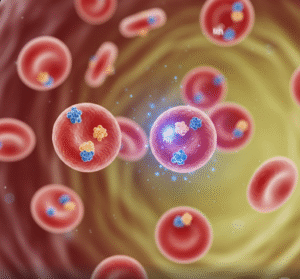Overview
Syndrome of Resistance to Thyroid Hormone (RTH) is a rare genetic disorder characterized by the body’s reduced responsiveness to thyroid hormones. Despite normal or elevated levels of thyroid hormones in the blood, tissues fail to respond properly, leading to a mix of symptoms that can mimic both hypothyroidism and hyperthyroidism.
What is Syndrome of Resistance to Thyroid Hormone?
RTH occurs due to mutations in the thyroid hormone receptor beta (THRB) gene. This mutation impairs the ability of body tissues to react to thyroid hormones, causing disrupted regulation of metabolism, growth, and development. The condition is usually inherited in an autosomal dominant pattern.
Symptoms
- Goiter (enlarged thyroid gland)
- Symptoms of hyperthyroidism: rapid heartbeat, irritability, weight loss
- Symptoms of hypothyroidism: fatigue, constipation, cold intolerance
- Attention deficit or learning difficulties in children
- Hearing loss or other neurological symptoms in some cases
Causes
- Genetic mutations in the thyroid hormone receptor beta gene (THRB)
- Inherited autosomal dominant pattern or sporadic mutations
Risk Factors
- Family history of RTH
- Genetic predisposition
Complications
- Misdiagnosis leading to inappropriate treatment
- Persistent symptoms affecting quality of life
- Growth and developmental delays in children
- Cardiac arrhythmias due to abnormal hormone effects
Prevention
- Genetic counseling for families with a history of RTH
- Early diagnosis through newborn screening and family history
- Avoiding unnecessary thyroid hormone treatments without proper diagnosis
Treatment Options in Korea
South Korea offers specialized endocrinology services with expertise in rare thyroid disorders like RTH.
Diagnosis
- Blood tests showing elevated thyroid hormones with non-suppressed or elevated TSH
- Genetic testing for mutations in the THRB gene
- Imaging studies like thyroid ultrasound to assess goiter
Treatment Approaches
- Symptomatic Management
- Beta-blockers to control symptoms like rapid heartbeat and tremors
- Monitoring and managing thyroid hormone levels carefully
- Thyroid Hormone Therapy
- Individualized thyroid hormone replacement or suppression therapy based on symptoms and hormone levels
- Multidisciplinary Care
- Endocrinologists, geneticists, and pediatricians collaborate for optimal management
- Supportive therapies for learning or developmental issues if present
- Follow-Up and Monitoring
- Regular thyroid function tests
- Cardiac evaluation for arrhythmias
- Growth and developmental assessments in children













